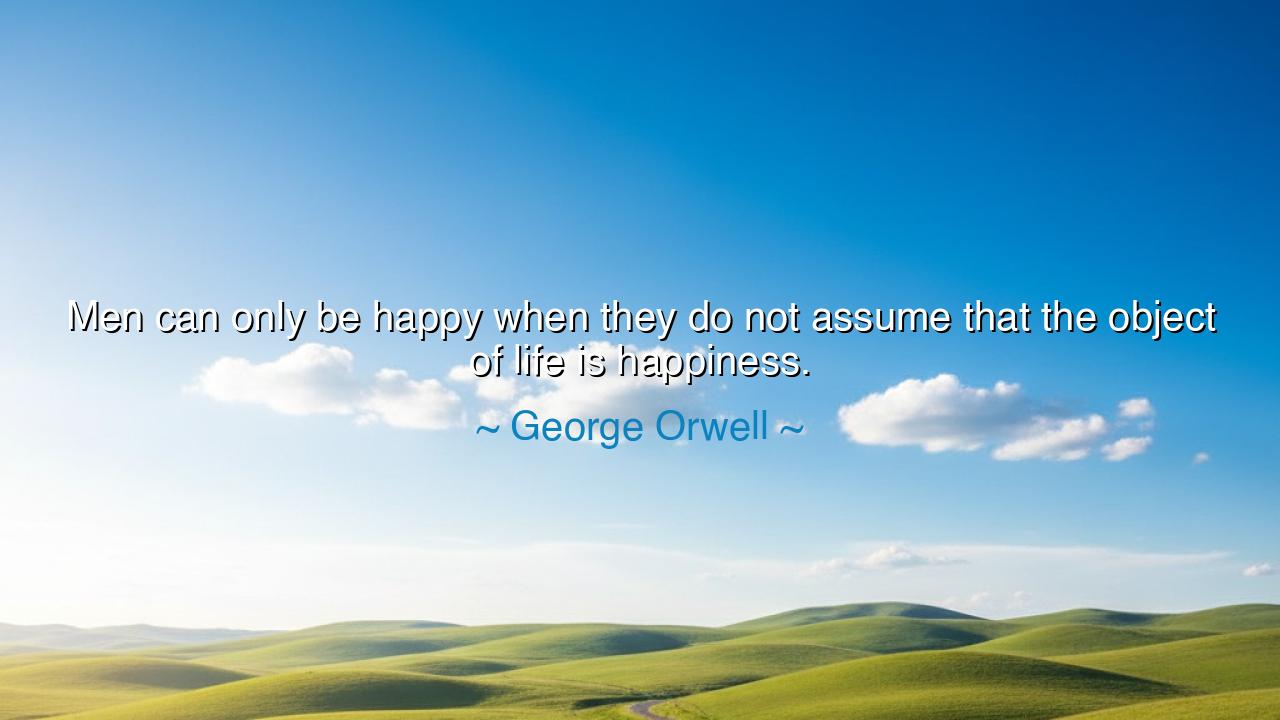
Men can only be happy when they do not assume that the object of






“Men can only be happy when they do not assume that the object of life is happiness.” Thus wrote George Orwell, the great watcher of truth, the chronicler of the soul’s struggle against illusion. In this brief but profound sentence, Orwell reveals one of the paradoxes of the human condition — that happiness, when pursued as an end in itself, slips away like mist in the morning light. He teaches that joy cannot be seized directly; it must arise as the byproduct of purpose, of duty, of something greater than self. When man makes happiness his idol, he becomes its slave. But when he forgets himself in service, in creation, or in truth, happiness returns to him quietly, like a faithful friend he had ceased to chase.
The origin of this quote lies in Orwell’s reflections on the spiritual and moral emptiness he saw in modern life. Living through the tumult of the twentieth century — through wars, ideologies, and revolutions — he witnessed how men, in their pursuit of pleasure, power, or comfort, often lost the very meaning of existence. For Orwell, happiness was not the accumulation of pleasure or the absence of pain, but the peace that comes from living rightly. He saw that societies obsessed with comfort and satisfaction often lost their moral center. The pursuit of happiness as the “object of life,” he warned, breeds selfishness, apathy, and despair. True contentment, he believed, comes not from self-indulgence, but from integrity, from aligning one’s life with truth, even when it demands sacrifice.
When Orwell says that men are happy only when they do not assume happiness to be life’s object, he means that happiness is a consequence, not a goal. The farmer does not stare at his crops waiting for them to grow; he tills the soil, sows the seed, endures the weather. And in time, the harvest comes. So too with joy — it is born of effort, not demand. The man who works with purpose, who loves deeply, who gives himself to something enduring, will one day look back and realize he has been happy all along, though he did not seek it. But the one who pursues happiness directly — through wealth, fame, pleasure — finds himself in an endless chase, for the heart grows empty the more it hungers for itself.
History gives us many examples of this truth. Consider Albert Schweitzer, the philosopher, musician, and missionary who abandoned the comforts of Europe to serve as a doctor in Africa. He did not go in search of happiness; he went in search of meaning, of service. Yet in his letters and writings, one finds not bitterness, but a serene joy — the quiet contentment of one who lives in harmony with his purpose. So too, Mahatma Gandhi, who renounced wealth and status to seek justice for his people, declared that “the best way to find yourself is to lose yourself in the service of others.” Neither man sought happiness — yet both found a peace that comfort and pleasure could never have given them. Their lives were proof that happiness belongs not to the seeker, but to the servant of truth.
Orwell’s insight also carries a warning for our own age, an era intoxicated with the search for happiness. The world tells us to pursue comfort, to chase pleasure, to “live our best lives.” Yet the more we chase, the more restless we become. We seek happiness as if it were a prize to be won rather than a grace to be received. The result is a generation that knows how to entertain itself, but not how to endure; how to consume, but not how to create. Orwell’s words call us to remember the deeper purpose of living — to seek meaning rather than mere satisfaction, to strive for goodness rather than gratification. For only when the heart serves something higher does happiness descend like sunlight after toil.
To live by Orwell’s wisdom is to turn the gaze outward, away from self and toward the world. It means choosing duty over indulgence, love over vanity, truth over comfort. The artist finds happiness not by chasing praise, but by perfecting his craft. The parent finds it not in ease, but in sacrifice. The citizen finds it not in personal gain, but in working for the good of others. The secret is not to seek happiness, but to seek what is right, and let happiness follow as the shadow follows the body.
So, dear listener, let this truth take root in your soul: Do not make happiness your goal; make virtue your path. Wake each day not asking, “How shall I be happy?” but rather, “What good shall I do?” In fulfilling your purpose, happiness will come to you quietly and without demand, like a melody rising from unseen strings. Live with courage, love with integrity, labor with faith, and happiness will follow, not as your master, but as your companion.
For as George Orwell teaches, the man who ceases to seek happiness as the object of life discovers it in every act of meaning. When the heart forgets to ask for joy, joy descends upon it freely. And that, perhaps, is the truest happiness of all — to find peace not by reaching for it, but by living for something greater than oneself.






AAdministratorAdministrator
Welcome, honored guests. Please leave a comment, we will respond soon